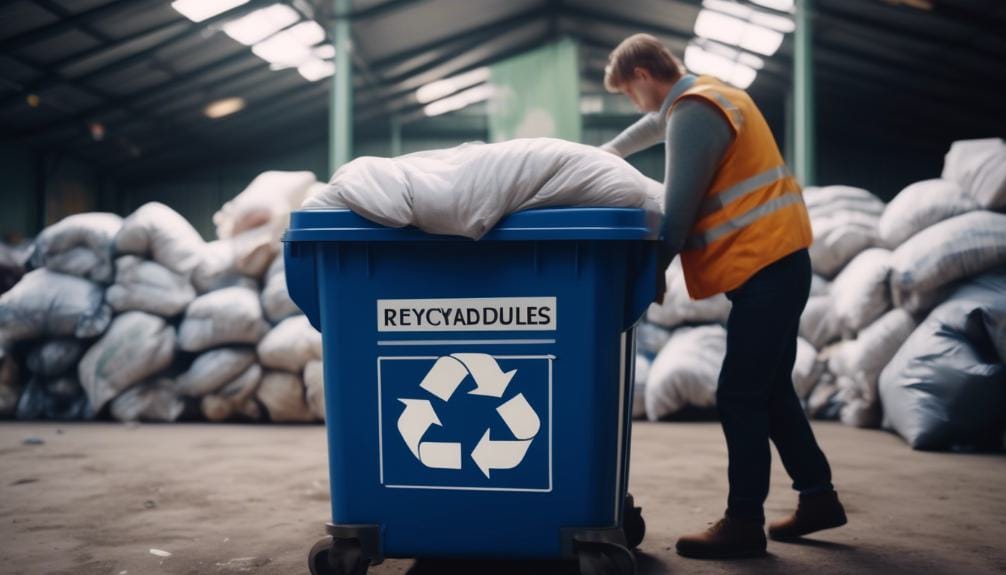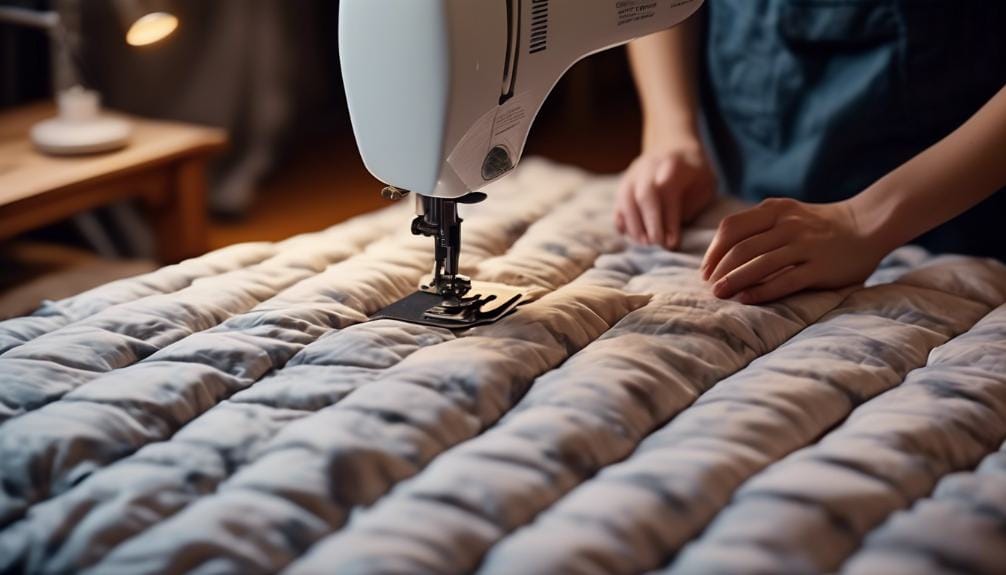How to Recycle Duvet: Eco-Friendly Disposal Tips
Did you know that recycling duvets can be quite tricky due to their synthetic materials? While it may seem like the only option is to toss them in the trash, there are actually several eco-friendly disposal methods you can explore.
From donation options to repurposing ideas, there are ways to ensure that your old duvet doesn’t end up in a landfill. Let’s explore some sustainable solutions for duvet disposal that not only benefit the environment but also give your old duvet a new purpose.
Key Takeaways
- Duvets cannot be recycled due to their synthetic materials and pose challenges for environmentally friendly disposal.
- Donating duvets to shelters and organizations that care for animals in need is a meaningful option.
- Reusing duvets as picnic mats, pet beds, or insulation for DIY projects extends their usefulness and reduces waste.
- Connect with local textiles recycling programs or compost natural fiber duvets for eco-friendly disposal.
Can Duvets Be Recycled?

Unfortunately, duvets can’t be recycled due to the synthetic materials used in their construction, which aren’t recyclable and can contaminate other recyclable waste if mixed.
However, there are eco-friendly ways to dispose of them. Many local shelters or animal rescue organizations accept bedding items such as duvets and pillows, even if they’re no longer suitable for household use. These organizations often use them to provide bedding and comfort to animals in need.
Before donating, ensure the duvets are clean and in good condition. By donating to local shelters or animal rescue organizations, you can give your duvets a second life, serving a meaningful purpose and supporting those who care for animals in need.
Donation Options for Duvets

Consider donating your old duvets to local animal shelters, homeless shelters, or charity organizations to give them a second life and provide comfort to those in need.
Many local animal shelters gladly accept old duvets to use as bedding for rescued animals. Similarly, homeless shelters may welcome donations of old duvets that are in good condition, as they can provide warmth and comfort to those experiencing homelessness.
When donating, ensure that the duvets are clean and free of tears, as this will make them more suitable for reuse. While some charity organizations may not accept duvets, there are specific shelters and animal rescue charities that will appreciate your donation.
Reusing old duvets in this way is a wonderful opportunity to give back to your community and support those in need.
Reusing Old Duvets

Explore creative and practical ways to give your old duvets a new purpose and extend their usefulness. Instead of disposing of old bedding items, consider reusing old duvets in the following ways:
- Use old duvets as a picnic or beach mat by sewing a shower curtain liner to one side for waterproofing.
- Create a DIY pet bed by cutting and sewing the duvet, fishing line, and needle/sewing machine.
- Turn an old duvet into a cool box liner to help insulate and keep items cold.
Eco-Friendly Disposal Methods

To responsibly dispose of old duvets, you can connect with local textiles recycling programs or donate them to shelters for reuse. Animal shelters or homeless shelters often welcome duvet donations to provide warmth and comfort. Additionally, consider composting natural fiber duvets, like those made of organic cotton, or repurposing them for DIY projects or pet bedding. If replacing a duvet due to dust mites, explore eco-friendly options made from synthetic materials designed to minimize allergens. The Salvation Army or other charitable organizations can also help you find environmentally-friendly options for properly disposing of old duvets. Here’s a table to help guide your eco-friendly disposal decision:
| Disposal Method | Description | Emotional Impact |
|---|---|---|
| Textiles Recycling | Reducing waste, helping the environment | Feel good about helping the planet |
| Donating to Shelters | Providing warmth and comfort for others | Helping those in need |
| Composting or Repurposing | Minimizing environmental impact | Reduce guilt about waste |
Sustainable Duvet Disposal

When it comes to sustainable duvet disposal, your old duvets, made from synthetic materials, pose a challenge for environmentally friendly options due to their non-recyclable nature and shedding of toxic microfibers. However, there are still eco-friendly ways to dispose of them responsibly.
Consider donating your old duvets to animal shelters or homeless shelters to provide comfort and warmth to those in need. You can also repurpose old duvets as picnic mats, pet beds, or insulation for DIY projects to prevent landfill disposal.
If your duvet is still in good condition, some textile recycling centers may accept duvets to break down over time. When it’s time to replace your duvet, choose sustainable and biodegradable options, or look for home products made from natural materials to reduce environmental impact.
Frequently Asked Questions
How Should I Dispose of an Old Duvet?
To dispose of an old duvet, consider donating to local animal shelters or homeless shelters. Alternatively, repurpose it as a picnic or beach mat, pet bed, or cool box liner. Find eco-friendly ways to give it new life.
What Can I Do With an Old Down Duvet?
You can repurpose an old down duvet by donating it to shelters, using it for DIY projects like picnic mats or pet beds, or seeking textile recycling programs for eco-friendly disposal. These options help reduce waste and benefit others.
What Can I Do With an Old Duvet Cover?
You can repurpose an old duvet cover for various practical uses, like creating reusable fabric bags, making pillowcases or cushion covers, or even using it as a protective covering for delicate items during storage or moving.
Which Charities Take Duvets?
Check local animal shelters and homeless charities; they may accept duvets in good condition. Ensure to verify their donation guidelines. If not, consider textile recycling schemes like Dunelm Textile Take Back or H&M Garment Collecting Programme.
Conclusion
In conclusion, when it comes to recycling duvets, it’s important to consider eco-friendly disposal options. Since most duvets aren’t recyclable, donating them to animal shelters or homeless shelters, repurposing them for various uses, or contacting local textiles recycling schemes are great alternatives.
By choosing sustainable disposal methods for your duvets, you can help reduce waste and contribute to a more environmentally friendly approach to getting rid of old bedding.
